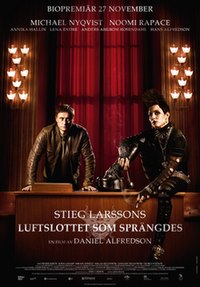 |  |  |
This is a review of the three Swedish films that make up the Millenium Trilogy, based on the best selling books by Stieg Larsson. The movies are detective stories centered on Mikael Blomkvist, a reporter for the magazine Millenium, and a tough lesbian computer hacker, Lisbeth Salander I'll do a short description of each story, trying to keep it as spoiler free as possible (although obviously I will have to let a few things out) with a brief summary afterwards. NOTE: these were the Swedish versions with subtitles that I watched and the subtitles didn't always seem to fit so it's possible I have a few details off.
The story: the first movie in the trilogy starts with Blomkvist losing a libel case against a corrupt Swedish industrialist and sentenced to jail. When he gets out, he is asked to investigate the 37-year old case of a girl who went missing. It is a classic detective case: the family lives on an island and the bridge to the mainland was closed. There was no way on or off the island, and yet the girl completely disappeared. The man who hires Blomkvist suspects a member of his own family, but does not know who. Meanwhile, the corrupt Swedish industrialist had hired a tough, leather wearing computer hacker, Lisbeth Salander, to spy on Blomkvist. She has become fascinated by him and comes to help him with the case. Together they begin to crack open the case and reveal all the dark family secrets the family had kept hidden.
The story: we start a year after the end of the first movie. Lisbeth Salander has been abroad, using her hacking skill to amass a large amount of money. Blomkvist has been trying to keep in touch with her, but she doesn't respond. At the Millenium, a young reporter has uncovered information about a human trafficking/prostitution ring that has ties to members of government. As he is investigating he is murdered and Lisbeth Salander is framed for it. It gets worse when her guardian, the man who raped her in the first movie, is also murdered. Blomkvist believes she is innocent and they both (seperately) will try to unravel the case, but to do it they will have to delve deeper and deeper into Salander's past.
The story: starting immediately at the end of the second movie. Lisbeth Salander has been apprehended by police, still accused of the murders. She is placed in the hospital while she recovers from her injuries and awaits trial. Meanwhile, Blomkvist tries to uncover why Lisbeth has been so mistreated, leading to a conspiracy within the government and leading deeper and deeper into Lisbeth's past.
Larsson also doesn't seem that interested in the traditional detective story. Much like HANNIBAL was very different from SILENCE OF THE LAMBS, but the second and third films are very different from the first. In fact, while the first movie worked best as a buddy-detective movie, Salander and Blomkvist are almost never together in the second or third movies, as Larsson movies from a standard detective story-structure to something that will let him delve into the psyche of his most interesting character, Lisbeth Salander.
In fact, as detective stories, the movies didn't do much for me at all. The cases themselves were in parts okay, in others difficult to follow (which might be from bad translations or from my habit of multi-tasking), but at no time did I find the mystery of the missing girl of the first movie or the murders/conspiracy of the second and third movies to be particularly engrossing. So as pure detective movies, I'd probably pass.
What made the movie work for me was the character Lisbeth Salander. She was abused as a child, wrongly institutionalized and now then further abused. Now is a fiernce, intelligent, uncompromising force of nature in these movies. I don't think it's an accident that the first movie is named after her (well, the American name -- the original Swedish name is "Men who Hate Women") and that the second and third movie focus more and more on Lisbeth and her past. Some of this works and some doesn't. I thought the second movie was the weakest of the three. The framing and revealing of her past was a bit too much, making her the center of a decade-long conspiracy. The third movie continues this, but switches focus in the second half to a trial where Lisbeth has to face the psychiatrist who committed her as an adolecent and wants her to be committed again. It is a fascinating section, where we see how the system has been manipulated by men to silence her and to allow her abuse to continue. And it is Lisbeth's response -- not wild anger, but with intelligence and a fierce will -- that make the movie worth watching.
If you think of the movies as being great detective stories you might be disappointed, but if you see them as a chance to meet one of the most interesting female characters of the last few years, the movies are a pretty cool trip.
No comments:
Post a Comment